Sexual harassment in Egypt and Sudan: A comparison
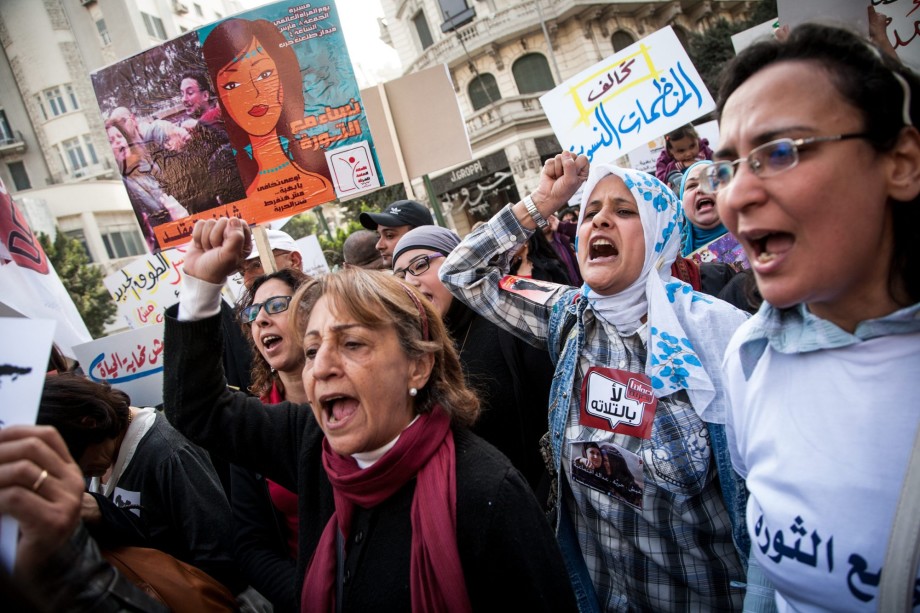
A women’s rally in Cairo supporting the role of women in the Egyptian revolution. (Source: www.thedailybeast.com)
As a Sudanese woman living in Egypt, I’ve noticed and indeed, internalized one of the most glaringly obvious and disturbing remnants of the Egyptian Revolution: sexual harassment.
I, myself, have been subjected to minor forms of sexual harassment such as catcalls, whistling, leering by men or mere boys as young as 16 or 17, inappropriately staring at me, even when I’m with my husband.
In Egypt, no deterrent to this behaviour exists, not in the threat of deportation, punishment, or even police action. Rape or sexual harassment isn’t about sex or desire, but about power. Therefore, the frustrations felt over the growing gap between the obscenely rich and poor, the unfulfilled hopes of the revolution that faded into thin air, the lack of stability and security in the country, all manifested in the widespread phenomenon of sexual harassment as a trickle-down effect of the economic hardships and social upheavals that seemed to increase tenfold after the Revolution. Call it a misguided attempt by men, especially, in the lower socio-economic brackets, to regain some semblance of power, even if it’s over the most marginalised section of Egyptian society.
On the other hand, Sudan has always experienced economic hardships, suffering under the yoke of one dictatorial government after another, the current government being the most oppressive and incompetent to date. Yet I’ve walked in the streets of Khartoum, in all manner of dress, long skirts or tight jeans, as have many women I know and I’ve always somehow felt safe.
During Sudanese weddings, some women dress conservatively – in the traditional Toub, adorned with gold jewellery and henna-decorated hands and feet – and others, especially young girls, wear more contemporary attire such as sleeveless or strap-less evening gowns. While men might throw appreciative glances at a pretty girl here or there, there is no inappropriate ogling or touching of any kind.
So why is it that sexual harassment is more prevalent in Egypt, a country that has always fared better than Sudan, at least economically? One possible theory, amongst many, could be that Sudan and specifically, Khartoum, is a very close-knit society. Everyone is related by blood or marriage or is, at the very least, acquainted with everyone else through friendship, work, or the neighbourhood. I remember during my father’s funeral, I was greeted by all his neighbours who came to pay their respects. Neighbours become like extended family, participating in all the major events, be it engagement parties, weddings or funerals.
Furthermore, since the population of Sudan – spread out over a large landmass – is way below that of the 85 million of Egypt, it is easier to forge lasting bonds amongst relatively smaller groups of people as opposed to millions of people coexisting in a megalopolis like Cairo. Indeed, I’ve noticed my Sudanese relatives keep in touch more than my Egyptian relatives do. So, communal bonds, therefore, tend to flourish not only as an extension of the nuclear family, but also as a deterrent to sexual harassment, which becomes a rarity rather than the norm, since no one wants to be known in the Sudanese community as a deviant preying on young women.
Your good name is the most valuable currency you own, after all. And this is very much the case in Khartoum. I am not at all suggesting that sexual assault against women doesn’t occur in Sudan. The war-torn areas of South Sudan and Darfur are rife with violence and it’s mostly women that bear the brunt of it. And also within Khartoum, there have been cases of sexual harassment. But these tend to be the exceptions to the rule. While in Egypt, sadly, it has become the general rule.

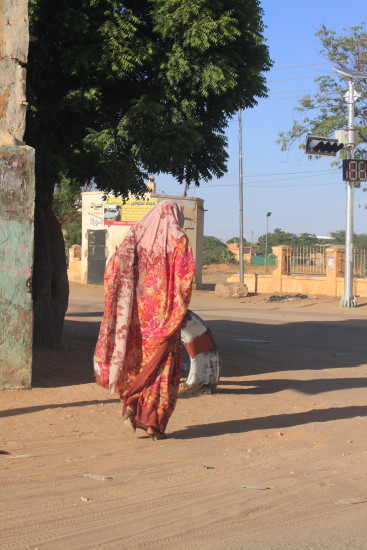

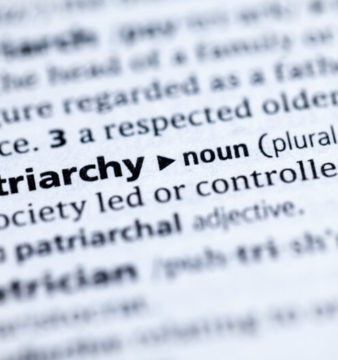
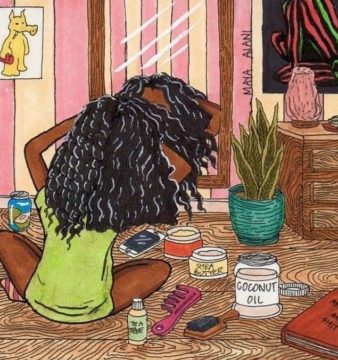
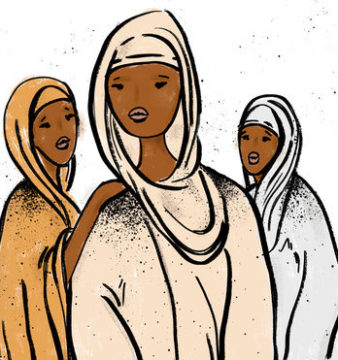
I completely disagree with what you said. Harassment in Sudan is widespread and it is a very serious problem. Which streets did you walk down? It is unbelievable to me that wearing tight jeans did not get one comment. Were you with male members of your family? I think it is dangerous to make statements like yours because people will read it and think all is well and good in Sudan when that is far from the case. No, we don’t feel safe and you shouldn’t say that or include the statement ‘in my personal experience’ but even that would be so ignorant and dismissive of the many women who live in Sudan and face problems every minute of the day. All you had to do was talk to some women, read some blogs written by women in Sudan and you would see how WRONG you got it. The article makes me sick because of your refusal to look anything up, oh just woke up and wrote something that will be published in a magazine about Sudan (the only English one? I’m not sure) to make you feel what exactly? Accomplished? Just stop. And I’d like to know who the hell accepted this piece. Absolutely ignorant and highly dismissive of ALMOST EVERY SUDANESE GIRL’S experience. Just for clarification, no we don’t feel safe. Even in areas such as riyad where people are supposedly of a higher class than your typical ignoramuses we get cat called, insulted, chased, talked to, approached, solicited and so much more. And in weddings those girls’ families are there, there are old people and adults, no one would hit on them at harass them in the presence of their,families. Simple as that. When you are dressed modestly and don’t wear makeup to draw attention, so much happens that it makes you question your sanity. Enough with the false representation. I also take issue with you,comparing Sudan and Egypt. Egyptian women speak out against harassment, hold rallies and organize campaigns to address these issues. You should feel glad to be a part of that. Whereas in Sudan nothing of the sort ever happened, unless you count one billion rising,which in my opinion is a waste of time with no real issues addressed (because dancing or singing to a group of people who already all know each other in one of the most expensive private schools in the country does NOTHING to enlighten or educate men and women on what is acceptable). Please, call me when you are walking down the street in tight jeans so I can document this rare occurrence of you not being harassed. I would LOVE to see that. And if you’re a teenager or a young girl, that explains a lot.
CAN WE SEE SOME REAL EDITING?
Also, not everyone in Sudan is related. Where do you get this dumb **** from? But I guess you have to say that to get your highly under researched point across and make it seem credible.
And also, South Sudan and Darfur? Really? These are the only places where sexual harassment occurs? God, my brain can’t take it. And the reason she states, because no one wants to be known as someone who preys on young girls!!!! Cue guffaw, hysterical laughter. Everyday struggles overlooked and ridiculous reasoning offered. It is very obvious that you don’t live here, maybe you shouldn’t write about Sudan,then. Or maybe do some research beforehand.
I think what you listed as reasons should be called hypotheses – plausible hypotheses but pending verification. I live in Sudan. I don’t drive so you’ll see me walking or getting Raksha/amjaad all the time and yes there are whistles and catcalls but I’ve not experienced anything more. Egyptian women are very outspoken about their plight and what they describe isn’t something that I have experienced or had a family or friend experience.
This does not mean it doesn’t happen. Many women prefer to not talk about these experiences and try to deal with them privately as one of the first questions she will be asked is ‘what were you wearing and what time was it’ – Sudanese culture might be better to women in a number of ways than other cultures but it remains patriarchal and the response to telling is more likely to be accusatory rather than supportive.
We know with conflict the rate of gender based violence goes up, and I am guessing this is why you singled out Darfur, and for good reasons too. But the only way we can do accurate comparisons and assess the situation for women in Sudan and identify predisposing factors is through a scientific study that interviews a large sample of Sudanese women from different walks of life: housewives, working women, students, those that drive and those that use public transport, etc., this way we can go some way towards drawing conclusions on the prevalence of sexual harassment of women in Sudan more accurately. Next, we work on the ‘Why’. Thanks for opening the debate though.
Interesting point of view.
I think it’s valid to state that there is a lower prevalence of predatory crimes and gender violence towards women, in Sudan, as compared to Egypt. However, I’m not so sure that I would ascribe the causal reason as that of good habits formed as a consequence of deterrence. I think rather, there are other interrelated factors: (1) departing histories, cultures, cultural norms, and the centrality of manners or “adab” in Sudanese society; (2) more controlled commercialization; (3) steady gradualization of the negative of effects that come with globalized capitalism.
Sudan–simply put–is not as urbanized, noisy, globally connected, and commercially developed, as Egypt is. Those are qualitative observations. Some would call them Marxist. But historically, ancient Egypt was also significantly different from ancient Sudan. The fact that Sudan boasts more smaller pyramids against Egypt’s fewer larger ones, illustrates the asymmetrical social and perhaps gender equality features of the latter relative to the former. Of course, this is a hypothesis. But it’s not difficult to see how even historical facts like this correlate with obvious cultural differences today.
I also think it’s important to retain objectivity.
Sudan does not operate under ideal conditions. The society is highly patriarchal, and the government is perhaps the most violent and repressive government in Africa.
Sudan is neither free; nor is it democratic. And there is no free press.
Data collection is concentrated in areas where international organizations do have access — when they’re able to. And that data perhaps focuses more on violence rather than harassment.
Data for other measures like coercion or intimidation are more difficult to come by in such conditions.
All of these factors collectively harm Sudanese society. Because freedom is self-propagating.